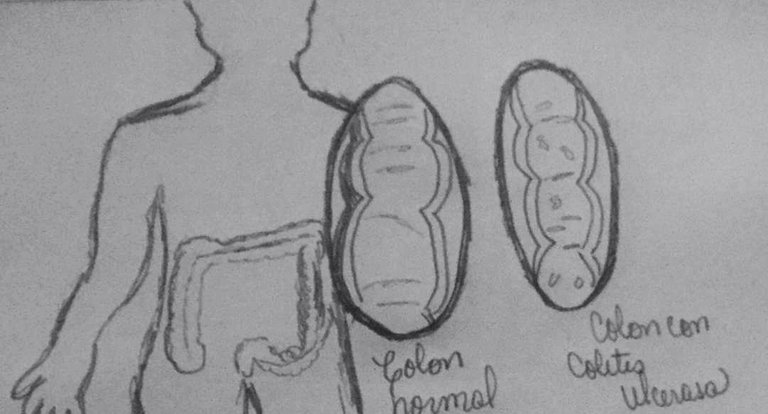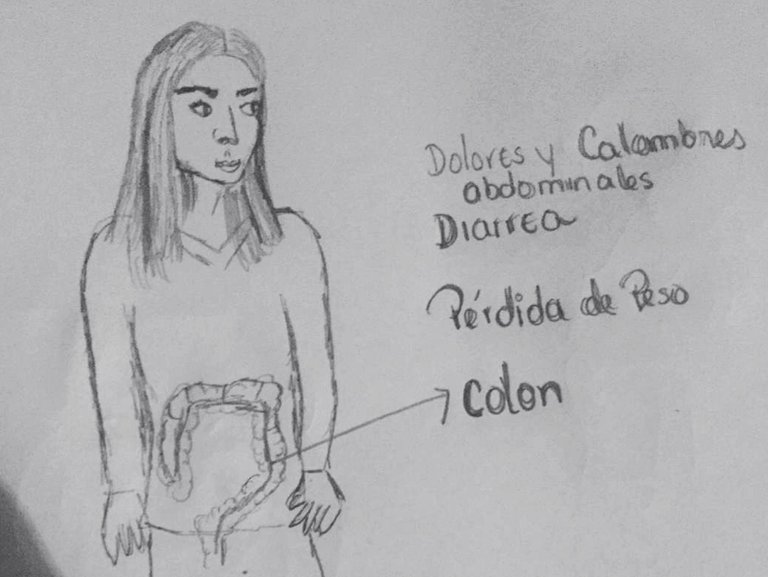Colitis Ulcerosa.
Hola Hivers, un gusto saludarlos, deseando para ustedes éxitos, traducidas en salud, amor y prosperidad.
Por aquí estoy, aguantando los estragos que produce el Covid-19, pero con la fuerza necesaria para compatir con ustedes, no puedo dejar de recomendarles que se cuiden, es justo y necesario, por ustedes, por su familia y por sus amigos, está lucha es de todos.
Hoy les escribiré un poco sobre LA COLITIS ULCEROSA

La Colitis Ulcerosa, entra en la clasificación de los llamados síndromes disentéricos y se caracteriza por ser una inflamación de la mucosa del colon de causa desconocida, que puede afectar al recto y a la totalidad del colon.
Es importante mencionar que la evolución es contante por lo cual tiende a volverse crónica, tanto en el curso por brotes y por posibilidades de complicaciones leves y graves.
Está afección se expres desde el punto de vista clínico, por repetidos ataques de diarreas, dolores tipo cólicos en el área abdominal, rectorragias, fiebre, malnutrición y alteraciones del estado general.
Convirtiéndose en una verdadera pesadilla para el paciente, quien expresa gran preocupación y malestar, afectado de manera acentuada su estado psicólogo, y no es para menos, pues los dolores van de moderados a severos y la rectorragia en ocasiones se vuelve voluminosa.
Está patología de presenta en 98% de los casos en pacientes con edades comprendidas de 20-50 años, y suele aparecer de firma súbita y verdaderamente dolorosa.
Más tarde la diarrea con sangre, con presencia de moco y pus en las heces fecales. De igual forma dolor en el área abdominal sobre todo en epigastrio, y hipocondrio izquierdo.
No podremos olvidar la rectorragia que se manifiesta como el síntoma inicial más común.
Es importante mencionar, que suele observarse en luego de las deposiciones mucha sangre en el papel higiénico o bien aparece moco sanguinolento que cubre las heces, lo cual en ocasiones es atribuido a la presencia de hemorroides, sobretodo si éste se acompaña de estreñimiento, lo cual causa irritabilidad rectal produciéndose evacuaciones intestinales frecuentes, con cantidades pequeñas de sangre y moco, lo que se denomina como seudodiarreas.

Cabe destacar, que conforme evoluciona la enfermedad en el tiempo y la fibrosis del colon aumenta progresivamente, dichos dolores tienden a disminuir.
También,se puede añadir al cuadro: hipoxemia, sudoración, náuseas, taquicardias, debilidad y deshidratación hidroelectrolítica.
Diagnóstico:
Se hará a través del examen físico Y exámenes completarios donde se indicará hemograma, tomando mucho en cuenta los niveles de hemoglobina ya que al existir una hemorragia tienen a bajar, examen de heces, que nos confirme que la presencia del moco, pus o sangre no se deba a otra patología, endoscopia para ver el alcancé de la lesión ulcerosa, e inclusive se puede mandar rx para determinar el nivel de aerocolia en el paciente y una biopsia para descartar una lesión maligna, pues los pacientes con esta afección tiene un factor de riesgo mayor de contraer cáncer de colon.
Tratamiento:
El médico tratante determinará el tratamiento en dependencia del estado del paciente, si está deshidratado procederá a reponer líquidos vía endovenosa.
En cuanto a la terapeutica acostumbrada, suele incluir, dieta, antibióticos, antiinflamatorios, inmunosupresores, analgésicos, inhibidor de la bomba de protones (omeprazol), y esteroides.
De igual manera, cuando los casos son graves, se plantea la cirugía, tomando en cuenta el estado del paciente.
Si sospecha de esta patología, es recomendable asistir al médico pues, un tratamiento oportuno es vital, para el paciente con Colitis Ulcerosa.
Gracias.
Díos siempre de cabrestero.
PD: Dibujo de mi propiedad.
English
Hello Hivers, a pleasure to greet you, wishing you success, translated into health, love and prosperity.
Here I am, enduring the ravages caused by Covid-19, but with the necessary strength to share with you, I cannot stop recommending that you take care of yourselves, it is fair and necessary, for you, for your family and for your friends, it is fight belongs to everyone.
Today I will write a little about ULCERATIVE COLITIS
Ulcerative Colitis falls under the classification of the so-called dysenteric syndromes and is characterized by being an inflammation of the mucosa of the colon of unknown cause, which can affect the rectum and the entire colon.
It is important to mention that the evolution is constant, which is why it tends to become chronic, both during outbreaks and due to the possibility of minor and serious complications.
This condition is expressed, from the clinical point of view, by repeated attacks of diarrhea, crampy pain in the abdominal area, rectal bleeding, fever, malnutrition and changes in general condition.
Becoming a real nightmare for the patient, who expresses great concern and discomfort, greatly affected his psychological state, and it is not for less, since the pain ranges from moderate to severe and the rectal bleeding sometimes becomes voluminous.
This pathology occurs in 98% of cases in patients aged 20-50 years, and usually appears suddenly and truly painful.
Later diarrhea with blood, with the presence of mmoco and pus in the stool. Similarly pain in the abdominal area especially in the epigastrium, and left hypochondrium.
We cannot forget the rectal bleeding that manifests itself as the most common initial symptom.
It is important to mention that a lot of blood is usually observed after bowel movements on the toilet paper or bloody mucus appears that covers the stool, which is sometimes attributed to the presence of hemorrhoids, especially if it is accompanied by constipation, which it causes rectal irritability producing frequent bowel movements, with small amounts of blood and mucus, which is called comp pseudodiarrhea.
It should be noted that as the disease evolves over time and the fibrosis of the colon increases progressively, these pains tend to decrease.
Also, it can be added to the picture: hypoxemia, sweating, nausea, tachycardia, weakness and electrolyte dehydration.
Diagnosis:
It will be done through physical examination and supplementary examinations where a blood count will be indicated, taking into account the hemoglobin levels since when there is a hemorrhage they tend to go down, stool examination, which confirms that the presence of mucus, pus or blood does not is due to another pathology, endoscopy to see the extent of the ulcerative lesion, and an X-ray can even be sent to determine the level of aerocolia in the patient and a biopsy to rule out a malignant lesion, since patients with this condition have a factor of increased risk of colon cancer.
Treatment:
The treating physician will determine the treatment depending on the patient's condition, if he is dehydrated he will proceed to replace fluids intravenously.
As for the usual therapy, it usually includes diet, antibiotics, anti-inflammatories, immunosuppressants, analgesics, proton pump inhibitor (omeprazole), and steroids.
Similarly, when cases are severe, surgery is considered, taking into account the patient's condition.
If you suspect this pathology, it is advisable to go to the doctor because timely treatment is vital for the patient with Ulcerative Colitis.
Thank you.
God always the goatherd.
Congratulations @arturocajoti86! You have completed the following achievement on the Hive blockchain and have been rewarded with new badge(s):
Your next target is to reach 500 upvotes.
You can view your badges on your board and compare yourself to others in the Ranking
If you no longer want to receive notifications, reply to this comment with the word
STOPTo support your work, I also upvoted your post!
Check out the last post from @hivebuzz:
Support the HiveBuzz project. Vote for our proposal!
Su post ha sido valorado por @ramonycajal
Gracias, maestro.